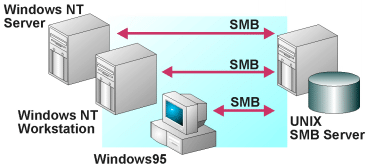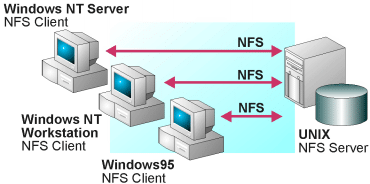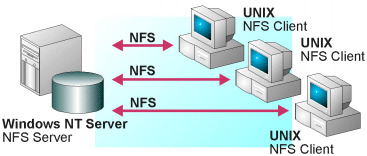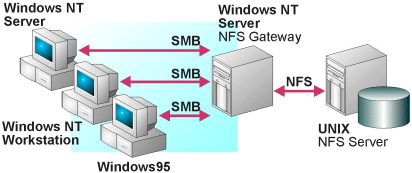
Because UNIX and Windows NT do not typically come with a compatible network file system, you need to add software to one operating for it to speak the language of the other. Windows NT uses the server message block (SMB) and UNIX uses the network file system (NFS). You can either make UNIX speak SMB or Windows NT speak NFS.
Given an option, people tend to prefer to do something with which they are familiar. There are third-party and public domain software solutions for both situations. These typically fall into one of the categories discussed below.
A UNIX daemon uses the SMB protocol to share file systems with Windows NT computers. This is a simple solution because it does not require you to make any modification to existing Windows-based client software or any user training for Windows NT users.
Examples: Samba and Syntax TotalNet.

Adding NFS software to every Windows computer that needs access to the UNIX file systems does not require you to make changes to the existing UNIX installation.
Examples: Intergraph IPC-NFS, FTP Software, Beame & Whiteside Connect NFS Client, NetManage, and Chameleon32NFS.

This solution enables UNIX NFS clients to access Windows NT file systems with no changes.
Examples: Intergraph DiskShare, Xlink Omni-NFS Server, Beame & Whiteside Connect NFS Server, NetManage Chameleon32NFS, and Process Software NFSware.

Installing NFS software on a single Windows NT server doesn’t require you to make changes to either the UNIX server or Windows clients. The gateway software redistributes the NFS to Windows clients using the SMB protocol. Performance is limited by the speed of the gateway. This is very similar to the scheme used by File and Print Services for NetWare (FPNW), where an NT Server gateways a NetWare file system to Windows clients.
Examples: Intergraph AccessNFS Gateway, Omniplex Omni-NFS Gateway, and Databit NFS Gateway.

Because files created on UNIX do not normally have an extension, or may have an extension that exceeds three characters, this could cause problems for Windows users who wish to double-click files to open them.
To ease integration, you may want to establish some guidelines for the files shared between UNIX and Windows NT. The following are examples of actions that may alleviate the problem:
UNIX uses utilities such as tar, cpio, and gzip to store multiple files in a single archive. These typically preserve directory structure, file permissions, and modification dates, or compress the files. Windows NT users use PKZip or WinZip for the most part. Utilities are available for each operating system to read the native archive format of the other. Windows NT comes with the pax utility as part of the base operating system. It reads and writes files in a pax, tar, or cpio format that can be used on UNIX.
©1997 Microsoft Corporation. All rights reserved. Legal Notices.
Last Updated: December 1, 1997